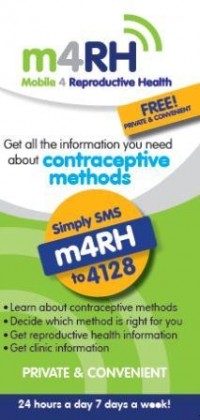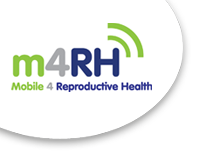
Promotion
m4RH is an “opt-in” service which means that users initiate communication with the system by requesting information. (Unsolicited messages are not pushed out to individual mobile phone users who have not accessed m4RH). As an opt-in service, people must know about m4RH in order to use it. Promotion is therefore critical to reach high numbers of potential users.
m4RH has been promoted in a variety of ways, including in clinic settings, at the community level, and via mass media.
During the pilot study, m4RH was mainly promoted in clinics. Partners such as Marie Stopes in Tanzania and Kenya and Family Health Options of Kenya displayed m4RH posters in their facilities, offered flyers in their waiting rooms, and asked their providers to notify clients of the service and distribute palm cards with the short-code. Examples of these promotional materials can be found under “Tools and Resources” below.
Over time, more partners began promoting m4RH in increasingly diverse ways. Partners including Pathfinder and the ROADS Project in Tanzania oriented their community health workers and peer educators to the service and provided them with the palm cards for distribution to their target audiences. Both PSI in Kenya and JHU-CCP in Tanzania featured m4RH within larger mass media campaigns promoting family planning.
While all promotional strategies have been effective, mass media has resulted in the largest subsequent increase in use of m4RH; the JHU-CCP promotion resulted in a ten-fold increase in hits to the m4RH service. Programs interested in promoting a service like m4RH will need to consider the costs of the different promotional strategies in relation to their available budget, recognizing that mass media is likely to be the most expensive option.
Tools & Resources
-
m4RH Magazine Advertisement
Various partners have advertised m4Rh as part of their public health campaigns, this is one example of an advertisement that was printed in a magazine as part of JHU CCP’s Jiamini campaign.
https://m4rh.fhi360.org/wp-content/uploads/2015/03/m4RH-Magazine-Advertisement.pdf
-
m4RH Tanzania Fliers (Swahili)
These fliers were used by partners to advertise m4RH and were often hung in clinic locations.
https://m4rh.fhi360.org/wp-content/uploads/2015/03/m4RH-Flier_Swahili.pdf
-
m4RH Kenya Fliers (English)
These fliers were used by partners to advertise m4RH and were often hung in clinic locations.
https://m4rh.fhi360.org/wp-content/uploads/2015/03/m4RH-Flier_English.pdf
-
m4RH Tanzania Palm Cards (Swahili)
This business card sized promotional tool provides information about accessing m4RH and a quick reference to the system codes.
https://m4rh.fhi360.org/wp-content/uploads/2015/03/m4RH-PalmCards-Swahili.pdf
-
m4RH Kenya Palm Cards (English)
This business card sized promotional tool provides information about accessing m4RH and a quick reference to the system codes.
https://m4rh.fhi360.org/wp-content/uploads/2015/03/m4RH-Palm-Cards_English.pdf
-
m4RH Tanzania Posters (Swahili)
These posters were used to promote m4RH in Tanzania.
https://m4rh.fhi360.org/wp-content/uploads/2015/03/m4RH-Posters_Swahili.pdf
-
m4RH Kenya Posters (English)
These posters were used to promote m4RH in Kenya.
https://m4rh.fhi360.org/wp-content/uploads/2015/03/m4RH-Posters_English.pdf
